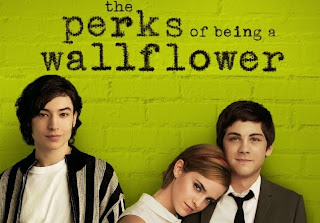This is one of the first novels that I have read in a long time that I just absolutely loved. Putting up quotes from this novel around my classroom is definitely an idea that has crossed my mind. I think as a narrator, Charlie has a very Holden Caulfield-esque style to him in terms of his honesty, sincerity, and vulnerability. They are also extremely different though in many ways (ie Charlie has more innocence and sweetness to him, Holden has more anger, etc). I think grouping The Perks of Being a Wallflower and The Catcher in the Rye together in a course would be super interesting. You could have students compare Charlie and Holden as characters and narrators, and ask them to think about the way in which both novels present adolescent experiences. In studying the two novels side by side, I think our students would come to see the ways in which certain aspects of adolescence are universal and timeless.
In teaching this book to adolescent students, I would certainly show the film, which I think was brilliantly done, in large part because Stephen Chbosky wrote the screenplay and directed it. I believe showing the film would not only be enjoyable for students, but also particularly helpful for students who maybe require different ways to learn other than simply reading and discussing. Particularly, it would be worthwhile to point to specific passages and then watch the scene in the movie so that students can access the text in two different ways.
Some themes I would want to discuss with adolescent students would include:
1. The Awkwardness of Being an Adolescent-
- This is pretty prevalent throughout the book, seeing as how Charlie is a relatively awkward and shy teen. From his feelings for Sam to his lack of feelings for Mary Elizabeth, Charlie's awkward encounters are very easy for adolescents to relate to and to view as realistic.
2. Participation: Being Passive vs Being Active
- Personally, I think this is probably the biggest theme in the book because this is the area in which Charlie seems to grow up the most throughout the novel. As a character, the reader sees him transform and truly live his life, rather than just think about living it. One of the final passages in the novel reads, "I think the only perspective is to really be there...Because it's okay to feel things. And be who you are about them." In addition, Charlie and the group of friends that he acquires do performances of The Rocky Horror Picture Show, which is a theater performance that calls upon active audience participation. Chbosky uses this to further emphasize Charlie's journey from passivity to activity, which is shown in the way that Charlie transitions from watching the performances to actually playing a character in them at one point eventually.
3. The Importance of Not Isolating Oneself
- Once Charlie gains friends and learns to connect with others in real, genuine ways, he begins to hate being alone. His darkest moments in the book often happen when he feels the weight of loneliness. One of the important lessons he learns by the end of the novel is that life is only truly lived when it is shared.
4. The Role that Literature and Writing Plays in an Adolescent's Life
- Bill assigns Charlie certain books that he believes will hold personal meaning for Charlie and then asks for him to write his thoughts on the texts. As Charlie does this, he begins to understand himself and others better, sometimes without even noticing that he is learning that from the texts. This is a good theme to highlight for students because I think it communicates to our students what our goals are as English teachers in terms of what we hope they will get out of the literature we present to them.

No comments:
Post a Comment